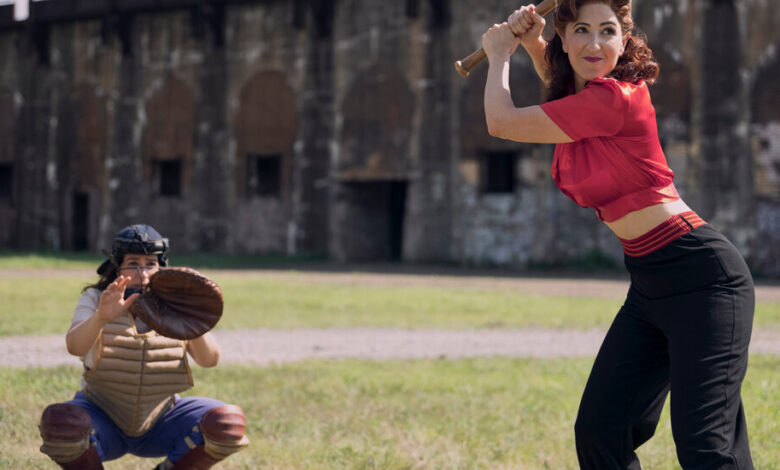Review: ‘A League of Their Own’ Broadens the Field

A subset of TV’s seemingly endless crop of reboots adapt well-known properties from yesteryear but with more thoughtful or thorough approaches to race or gender, or both. The 1960s are different when “The Wonder Years” centers on a Black family. There’s more to gossip about on “Gossip Girl” without the rigid do-si-do of a gender binary.
Similarly, a new version of “A League of Their Own” swings at ideas about queer identity and spaces, about race, and about Blackness in particular. But it can’t get its bat around fast enough to connect.
This “League,” available now, on Amazon, has the same setting as Penny Marshall’s near-perfect 1992 movie: It’s 1943, and the All-American Girls Professional Baseball League is debuting as World War II wears on and Major League Baseball’s labor pool continues to shrink.
The show splits its time between the nascent Rockford Peaches and Max (Chanté Adams), an ambitious pitcher excluded from the league because she’s Black. Both halves of the narrative wind through queer spaces and various character awakenings but only with a well-meaning mildness that feels like preamble rather than actual story.
As in the movie, which centered on Geena Davis’s Dottie, these Peaches find their anchor in a catcher: Carson Shaw, played by Abbi Jacobson, who created the series with Will Graham. We’re led to believe she is an excellent player, though we see so little meaningful on-field action that it hardly matters. Carson’s real story is the budding romance between her and her chic teammate, Greta (D’Arcy Carden, outacting almost everyone else).
Indeed, most of the Peaches we spend time with are queer, sneaking off to clandestine nightclubs, following strict rules to hide their sexuality from the violence of society and bristling at the league-enforced version of femininity. Max, too, tries to find her place among her gay and transgender elders, and she and Carson develop a passing but honest friendship.
Most sports stories are about how individuals learn how to perform as a team, but this version of “League” takes an intriguing different path by exploring how the safety net of a team allows for the growth of individuals. Carson encourages both her teammate Lupe (Roberta Colindrez) and Max to pitch as themselves, rather than throw what the coach wants or mimic the delivery of famous pitchers of the era.
But this idea of sport as expression doesn’t get explored much beyond that. Instead, baseball is lumped in with grocery shopping and comic-book fandom on the show’s list of potential but nonspecific arenas for self-actualization. If the creators see baseball as uniquely romantic or distinct from other sports or activities in its psychological or team-ethos demands, it’s not evident onscreen.
“They don’t get to tell us whether or not this is real,” Greta tells Carson in a locker-room heart-to-heart after finding out that the league is unlikely to survive and that the Peaches’ coach (Nick Offerman, briefly) thinks they’re a joke. This idea comes up repeatedly in “League,” that the participants decide what matters, that we create our realities by agreeing on them.
It’s a beautiful idea to espouse but one the show can’t quite embody. It does not transcend its artifice, and nothing feels true enough to matter — not phony, just superficial.
Period dramas are not obligated to recreate their eras authentically, and “League” seems happy enough to have its dialogue and sensibilities sound much more of the 2020s than of the 1940s, perhaps reflecting how out of sync its characters are for their era. But this also means the show’s attempts to tell truer, richer stories about the kinds of women who were mostly left out of the movie — and of many other movies and series — often ring false, coming across as jarring anachronisms, like the show’s use of mumble-humor and “epic.”
Over eight hourlong episodes, “League” has its bright spots — a sprinkling of vibrant moments, tender and thrilling flirtations. What’s missing are big emotions, jazzy razzle-dazzle and real tension or catharsis or drive. The actual baseball playing is vague and mostly in montage, and the usually obvious rhythm and built-in stakes of a sports season are not present.
The result is a show that feel less like a lived-in story than like a reverential “A League of Their Own”-themed party.
